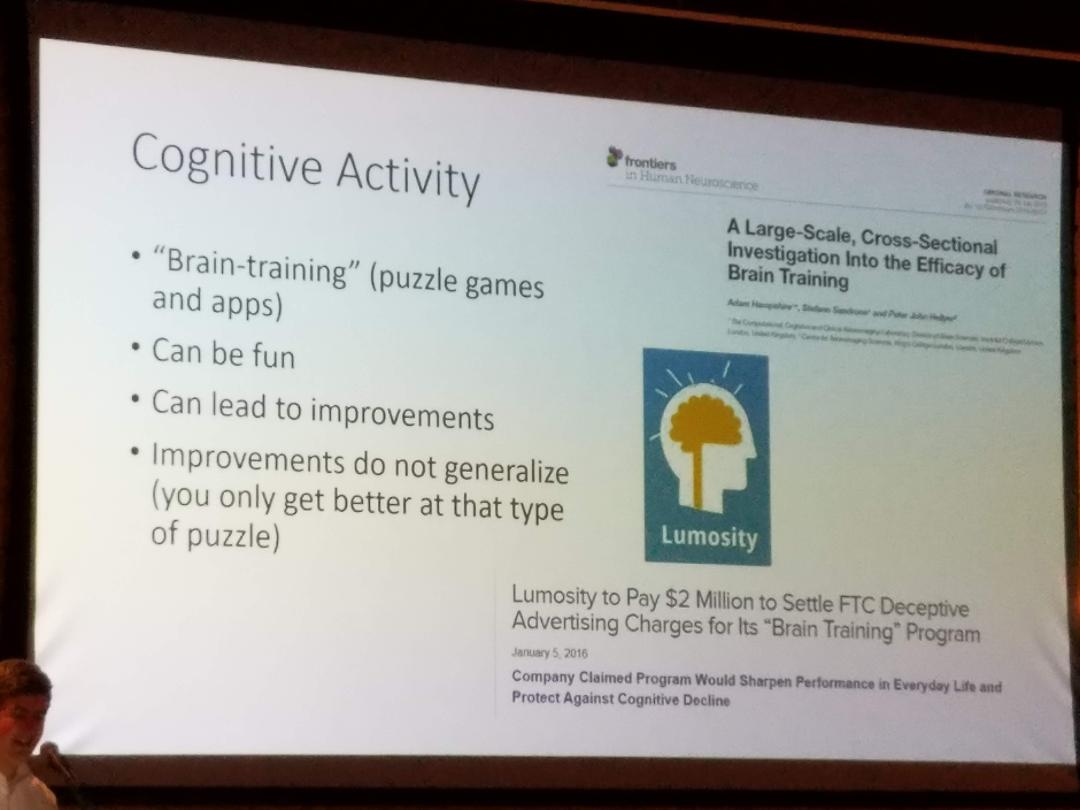 |
| What activities could help postpone dementia? |
One of the advantages of living near the University of California in Irvine is the amount of research they do on healthy aging, and their generosity in sharing it with people who live in the area. In June, 2022, Brian Hitt, MD, PhD from the UCI Department of Neurology shared some of what his department has discovered about the lifestyle factors which may protect your brain from excessive cognitive aging. It was a fascinating discussion, and I took photos of his slides so I could share what he had to say.
They Have NOT Found a Successful Dementia Treatment
First, is the disappointing news that despite the research that has gone into a number of different medications, UCI researchers have NOT found any over-the-counter or prescription medication that successfully reverses, stops or even slows down dementia, despite all the products we see advertised on television. UCI researchers have not found any that actually treat dementia, as of July, 2022. Hopefully this will change in the future, but this is their stance at the current time.
They HAVE Found Risk Factors Which Increase Your Chances of Getting Dementia
If you don't take care of your heart, your risk of dementia is higher. As a result, the activities you want to avoid include:
Cigarette smoking
Untreated high blood pressure
Untreated blood lipids (cholesterol)
Untreated diabetes
Genetics can also play a role, including the ApoE gene, as well as hundreds of other minor genes. While not all causes of dementia can be completely controlled, UCI has found that lifestyle factors play a significant role in whether or not some of the troublesome genes are activated. In other words, even if your genes are working against you, it is still possible to avoid or reduce your risk of dementia if you take care of yourself!
Lifestyle Factors Which are Protective
The higher your educational level and/or the higher your occupational attainment, the less likely you are to develop early dementia ... although it can still happen, just less frequently.
In addition, here are four other lifestyle factors which seem to help people delay cognitive decline:
Physical Activity such as walking, running, cycling, swimming, resistance training, yoga, Pilates, Tai Chi and similar activities. Surprisingly, they found that no particular physical activity seemed better than others. It was simply important that the person enjoyed them and was willing to do them regularly
Cognitive Activity included interacting regularly with friends and family, belonging to groups, and having a robust social support network. Social isolation is a strong and consistent predictor of faster cognitive decline. They found that the Covid pandemic was a particularly difficult time for many of their research subjects, because they isolated more and socialized less.
In addition, it MIGHT help you if you do brain training games. However, these games do not seem to generalize to improvements in overall cognitive function. People only tend to get better at doing the particular type of puzzle or game they have been working with. In fact, the website Lumosity has been sued for false advertising because of the ads they promoted which suggested that their brain games could prevent dementia.
Activities which DID seem to have a more generalized effect in slowing cognitive decline were reading, hobbies, learning a new language and learning music, the items in the slide at the top of this article. The key to benefiting from these cognitive activities is, like exercise, that you need to enjoy what you are doing and be willing to try to learn new things. Choosing activities you enjoy makes you more likely to engage in them consistently, and more likely to be willing to share them with other people, which can also benefit you. Trying something new challenges your brain and helps it make new connections.
Good sleep quality helps people in two ways. It had the short-term benefit of promoting a better mood, and more effective attention and concentration. The long-term effects of good quality sleep were even more significant. They included a reduction in" neurotoxicity and neuroinflammation, and slower neurodegeneration." In other words, a good night's sleep gets rid of toxins and inflammation in the brain and causes it to degenerate more slowly. Who wouldn't want to be in a better mood, while also getting rid of the toxins and inflammation in their brains? Try to get around 7 to 8 hours of sleep per night.
If you have sleep problems such as sleep apnea, snoring, gasping, or insomnia, you should talk to your doctor, get a sleep study done, and get your issues treated. You should also adopt habits which will improve your sleep quality such as having a regular bedtime, avoiding evening caffeine, avoiding computer and phone screens before bed, and relaxing in the evening.
Although most sleep medications are not generally recommended by the UCI team, taking 2 to 5 mg of Melatonin seemed effective in helping people sleep and did not appear to have the side effects associated with other drugs.
Reducing your stress and anxiety is also essential. In the short term, these negative emotions can cause you to have poor attention, as well as problems with memory and concentration. In the long term, they can damage your general brain health and speed cognitive decline. You may want to try talk therapy or take anxiety medications, as prescribed by your physician. You could also benefit from lifestyle interventions such as meditation, mindfulness, breathing exercises and guided relaxation, including those which use phone aps.
Diet can have a significant effect on the brain. The researchers found that people got the most benefit when they followed the Mediterranean Diet, the MIND Diet or the DASH Diet. They are all similar and effective at slowing cognitive decline. If you are not familiar with the MIND diet, you will find it helpful to check out this link to the book: "The MIND Diet: A Scientific Approach to Enhancing Brain Function and Helping Prevent Alzheimer's and Dementia." (Ad) It is an interesting book and could add years to the functional usefulness of your brain. What is the point in living longer if we lose our brain function along the way?
No supplements, including widely advertised ones like Prevagen, were found to have cognitive benefits. However, Dr. Hitt suggested that it was OK to take supplements which would not harm you, were inexpensive, and which make you feel better. These included Vitamin D3, B12, Omega-3 fatty acids in fish oil, and Turmeric. However, he said that the commercially prepared special brain formulations did not have any particular benefit in preventing or postponing dementia in the testing they did on the products.
While enjoying physical activities during retirement, don't forget the benefits of gardening. You can grow your own food, get exercise, get a natural source of Vitamin D, and benefit in other ways.
You can find gifts for retirees and others at my Etsy Store, DeborahDianGifts. Many of the gifts are made with photos I have taken and had turned into a variety of products. Check my shop out here:
http://www.etsy.com/shop/DeborahDianGifts
Enjoyed this post? Never miss out on future posts by following us. You will receive a weekly email with the most current post.
If you are interested in learning more about saving money, financial planning, Social Security, Medicare, where to retire, common medical issues as you age, travel and more, use the tabs or pull down menu at the top of the page to find links to hundreds of additional helpful articles.
Disclosure: This blog may contain affiliate links. If you decide to make a purchase from an Amazon ad, I'll make a small commission at no extra cost to you.
You are reading from the blog: http://www.baby-boomer-retirement.com
Photo credits: UCI slides by Dr. Brian Hitt, and Amazon book cover





